Thriving Through Crisis: A Year of Success for the THRIVE Program in Jere, Borno State
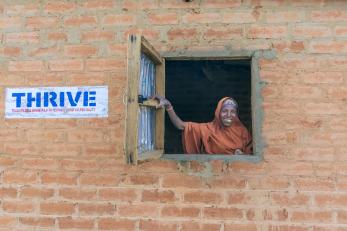
The Transitioning Households to Recovery from Vulnerability (THRIVE) program has achieved remarkable success after a year of implementation. The program has recorded significant accomplishments and gained valuable insights. THRIVE is an integrated area-based program funded by USAID/BHA and implemented by Catholic Relief Services (CRS) in collaboration with Mercy Corps, Women in New Nigeria (WiNN), and Salient Humanitarian Organization (SHO). It operates in selected Jere Local Government Area (LGA) wards in Borno State.
After the insurgency, families in the affected areas lost their means of livelihood, which translates to food insecurity. One such family was Hadama Tijjani's. Before the insurgency, Hadama and her family lived in Sama village in Konduga LGA. “Our family owned a farm on which we planted millet and beans. Every year, we harvest between 30 and 50 bags of beans,” she narrated. When the insurgency started, and their village was attacked, they came to Jere, where they depended on leaves from the bush and whatever they could find to survive. “Sometimes, I go to people's houses to wash and sweep for money while my husband works as a laborer at construction sites,” she explained.
When THRIVE came into Hadama's community, she was overjoyed to have been selected for the food assistance program. “I have seen how hunger drives people into adopting negative coping strategies. I have six daughters and was afraid our suffering would drive them into bad habits. I was relieved when the food distribution began,” she narrated. Hadama, who confirmed that millet was the only meal on their diet before the food assistance program, was enthused about the variety of available food. “Now we can eat eggs, meat, milk, and spaghetti. Even our children look much healthier now,” she said.
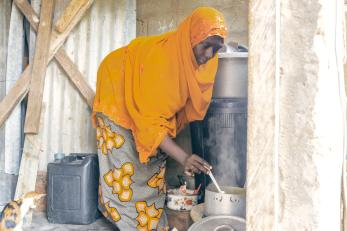
The food assistance participants were divided into three cohorts. Cohort one had 2,394 participants who received food for seven months; 470 participants from cohort one transitioned into agriculture. Four hundred forty-three participants were then registered to receive food for another seven months and formed the second cohort. The program has already enrolled another 2,382 participants to form the third cohort, which will receive food until January 2024.
For Aisha Suleiman, THRIVE was the push she needed to get back on her feet after the insurgency knocked her down. “Before the insurgency, we lived in Mafa. I frequently came to Maiduguri to purchase broilers to rear for Salah and other celebrations,” Aisha narrated. Incessant attacks on her community forced them to leave Mafa and seek refuge in Jere. Life has been complicated ever since for the family of eleven, often going days without food.
Relief came to Aisha and her family when she was profiled to participate in the agricultural component of the THRIVE program. The program's approach is such that participants first receive food assistance for four months before they fully transition into agriculture. Aisha received 10 Broiler chickens and inputs for the backyard garden. “When my husband saw that I was given chickens, ‘they have given you the opportunity to restart what you were doing in Mafa’, he exclaimed,” Aisha narrated.
Making the best of the support, Aisha sold five chickens and bought 20 more. Reflecting on her journey with THRIVE, Aisha said, “I am glad to have transitioned from food assistance to agriculture. This is because all I can do with food is eat it, but you see, farming and rearing animals are the foundation of wealth, and I am glad to have been put on this path by THRIVE.” She is very optimistic about the future and hopes to be able to grow her farm and have a sustained means of livelihood.
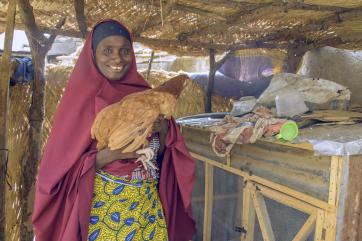
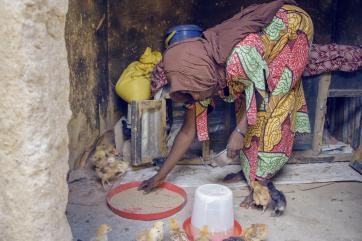
In its first year, the THRIVE program supported 1,500 women with perma garden inputs, 750 with 10 Broiler birds, and 186 farmers with seeds and tools for farming during the rainy season.
With the insurgency limiting access to farms and road access between LGAs constrained, Jere LGA has witnessed an increased prevalence of malnutrition. Kaltum Haman, a 30-year-old mother of seven, is one of several mothers who have seen their children suffer severe acute malnutrition (SAM) as a result of the insurgency. “When I noticed my 10-month-old baby was sick, I took him to the Therapeutic Feeding Center (TFC), where he received treatment for three days,” Kaltum narrated. Upon discharge, Kaltum was advised to supplement her son's food with more nutritious food. However, the hardship in her community makes it difficult to afford healthy foods, and Kaltum was faced with an uphill task and was overjoyed when she was enrolled to participate in the THRIVE program.
An essential activity under the program's nutrition component is providing supplemental nutrition assistance to pregnant and lactating women. They receive vouchers with which they can redeem nutritious foods from THRIVE vendors. Kaltum explained that she redeemed her fresh and fleshy food twice a month with a voucher value of 5 USD each. She said, “I redeemed oranges, carrots, guava, mango, cabbage, amaranthus, okra, sorel, cucumber, lettuce, meat, chicken, fish, and eggs. Because it will help my son recover well and prevent relapsing into severe acute malnutrition (SAM), I will continue to thank you all.” while expressing her joy.
During the twelve months under review, the nutrition component of THRIVE has reached 1,000 women with supplemental nutrition assistance.
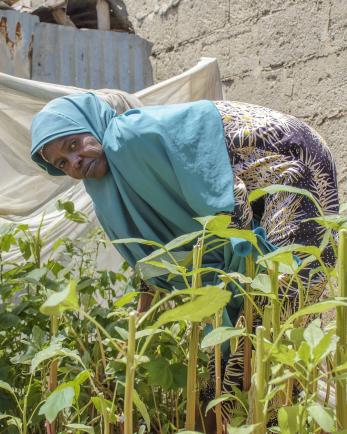
One significant consequence of the sustained insurgency in northeast Nigeria is the displacement of people from their homes to safer communities, with a report by Human Rights Watch estimating that as of 2022, 2.2 million people have been displaced. This has led to relatively safer LGAs like Jere experiencing a population boom, making houses more expensive and difficult to come by.
Fatima Musa, a woman living with a disability, lost her parents at the onset of the insurgency, and her mother's sister took her with her to Jere. They had nowhere to live in Jere and had to make do with a makeshift shelter. "When it rains, we have to go to other people's houses because our room is leaking." she lamented. This is a thing of the past, with THRIVE building a mudbrick shelter for her. The shelter model is a product of Mercy Corps' stabilized mud brick shelter research, and Fatima is glad to be one of the first few to have this innovation. THRIVE built 110 mud brick and 40 transitional shelters for vulnerable internally displaced persons in its first year.
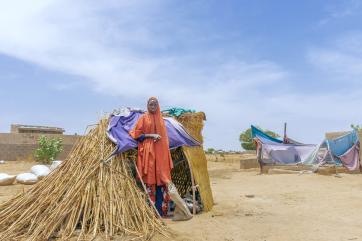

Ibrahim Sani’s parents relocated from Katsina State, and settled in Borno State before he was born. Such was the appeal Borno State had before the insurgency, and it is the only home Ibrahim grew up to know, and he loved every inch of it till the insurgency set in. “My business crumbled, and survival became increasingly difficult,” he narrated.
As though the struggle to get food wasn’t hard enough, Ibrahim and his family faced the challenge of getting water. “We go days without water,” he lamented. “Sometimes, we spend as much as 0.65 USD to get water. Even when you have the money to buy, the water vendors take hours to deliver, and the nearest place to get water is almost an hour away,” he continued.
Having identified the need in the community, THRIVE dug a solar-powered borehole there, which has been an enormous source of relief to community members, Ibrahim included. “I feel like this borehole is inside my house because of how close it is to me,” an overjoyed Ibrahim narrated. “Beyond the provision of water, this borehole has also united us. People from other communities come to fetch water here, and we all work together to secure and protect it from any form of vandalism,” Ibrahim further explained.

The THRIVE program has so far supported participants and community members by rehabilitating 355 blocks of household latrines, 25 bathing shelters, 26 boreholes, and desludging 378 cubic volumes of solid waste.
When reminiscing about the impact the protection component of THRIVE has had in the communities, a quote comes to mind, “Evil persists when good people are quiet.” Sadly, many African communities, Jere included, have a culture of silence when it comes to the topic of Gender Based Violence (GBV) and other protection concerns. This is evidenced by the fact that a teacher in the community school had been sexually molesting girls in the school for years without being reported by the children.
THRIVE's protection program in Jere includes the establishment of safe spaces for women and adolescents, as well as active sensitization on gender-based violence (GBV) in schools and for parents. By bringing protection and GBV concerns to the fore, people got more comfortable talking about them, which led to the community school students reporting the teacher's actions to their parents. The parents reported this to the community leaders, and appropriate actions were taken against the teacher. “THRIVE has accomplished something remarkable in our community, surpassing anything other organizations have done. Thanks to their efforts, our children are now safe from harm and can pursue their education without fear,” Bulama Modu Kale, the community leader, narrated.
In the twelve months of THRIVE's implementation, THRIVE has established 20 safe spaces, including 13 for girls and 7 for boys, 4 Women and Girls Safe Spaces (WGSS), conducted awareness sessions with 8,535 participants on prevention and response to gender-based violence (GBV), and provided training to 230 partners, staff, and community stakeholders.

THRIVE's ultimate goal is to see crisis-affected internally displaced persons and host communities living in emergencies transition to early recovery. The program's Early Recovery and Market Systems (ERMS) component has attempted to initiate early recovery in Jere over the past twelve months. The ERMS approach is two-pronged: establishing savings groups among community women to instill a culture of savings while offering soft loans to members and training community youths with vocational skills while teaching them soft business management skills.
Falmata Ali is a member of the Zumunci Savings Group in the Sumari community of Jere. While sharing the impact of the savings group on her, she said, “Even my husband contributes through me. While in the group, I borrowed ₦15,000 to start my charcoal business. I have not only repaid the loan but also witnessed tremendous growth in my business.”
Furthermore, the impact of the savings group extends far beyond financial benefits. It has brought the members closer together, fostering a sense of unity and support. Hadiza, another member, said, “I used to live on the same street as many of these women, but we had never truly connected until we joined this group.” Fatima added, “Beyond our regular meetings, we celebrate or console our fellow members whenever needed. We named the group 'Zumunci,' which means togetherness in Hausa.”

Isa Modu is a youth participant in the vocational skills training program, learning vehicle repairs and maintenance. After losing his parents, he took on the responsibility of caring for his younger siblings. Despite being supposed to receive training three times a week, he chose to work every day instead. “I am passionate about this skill and want to learn as much as possible, and that is why I come every day,” he narrated.
THRIVE’s ERMS component has, in its first year, enrolled 700 youth in vocational and business development training, trained 550 artisans, created 600 poultry mother units to build their entrepreneurial skills, and facilitated the creation of 100 Savings and Internal Lending Community (SILC) groups.
The first twelve months of THRIVE have been a very steep learning curve for all partners involved. As the team gears up for the second phase, plans for adaptation and implementing lessons learned are in place, like the agriculture team’s plan to introduce the distribution of small ruminants and the Multi-Purpose Cash Assistance’s plans to start cash consumption smoothing. With a supportive government, a motivated team, and a welcoming community, THRIVE is primed to exceed expectations, initiating early recovery in communities in Jere LGA of Borno State.